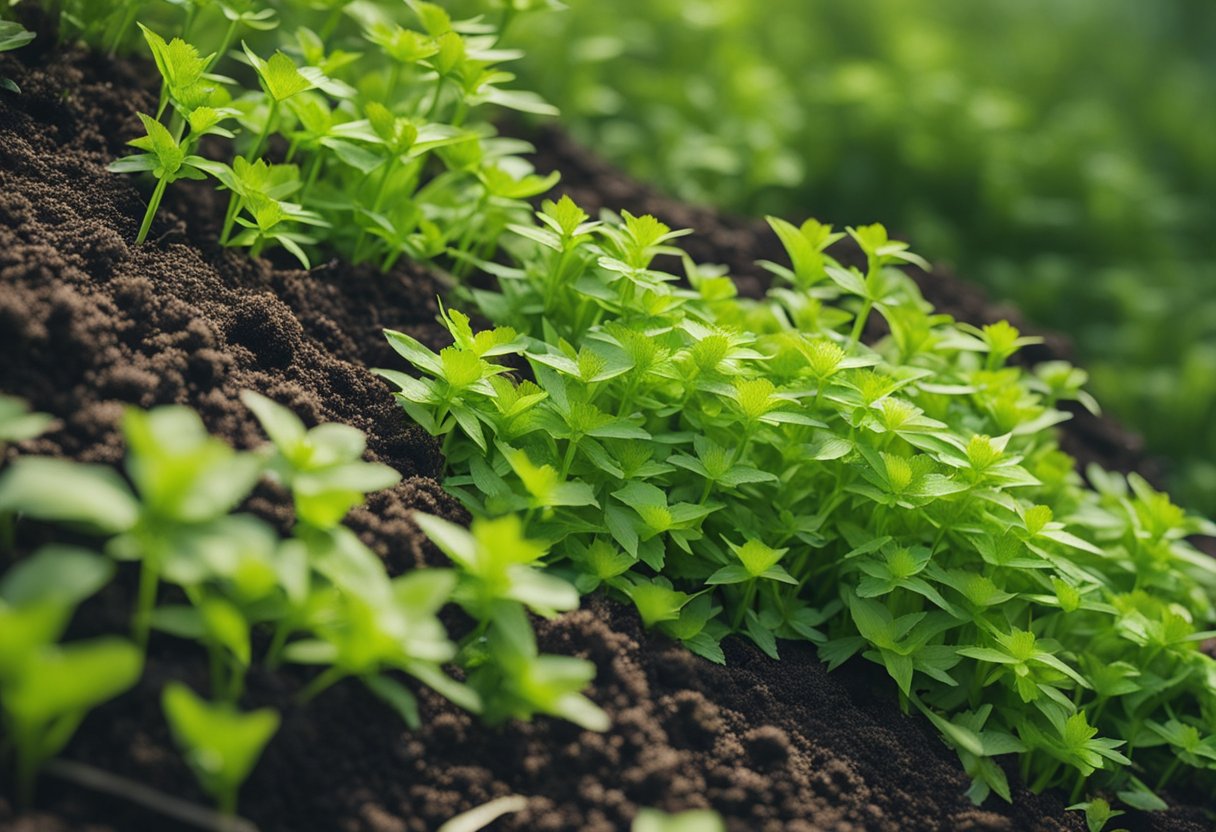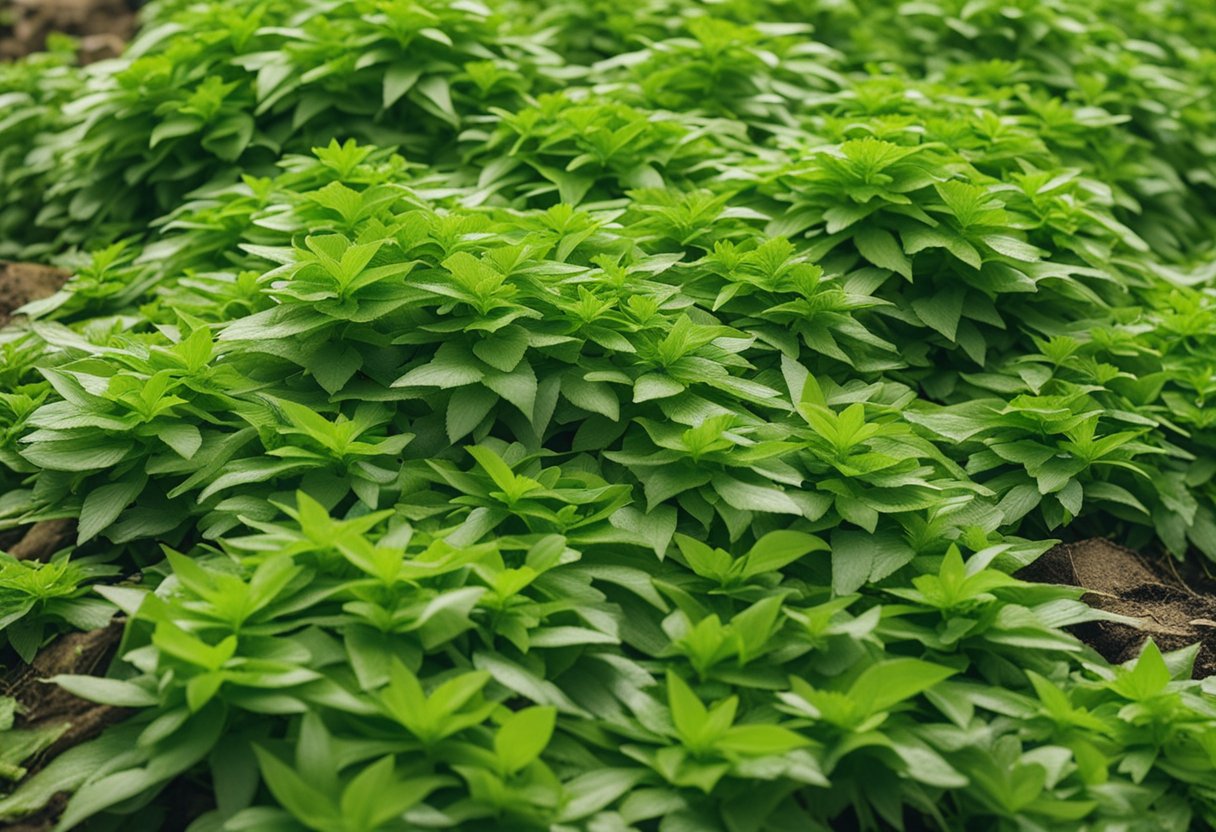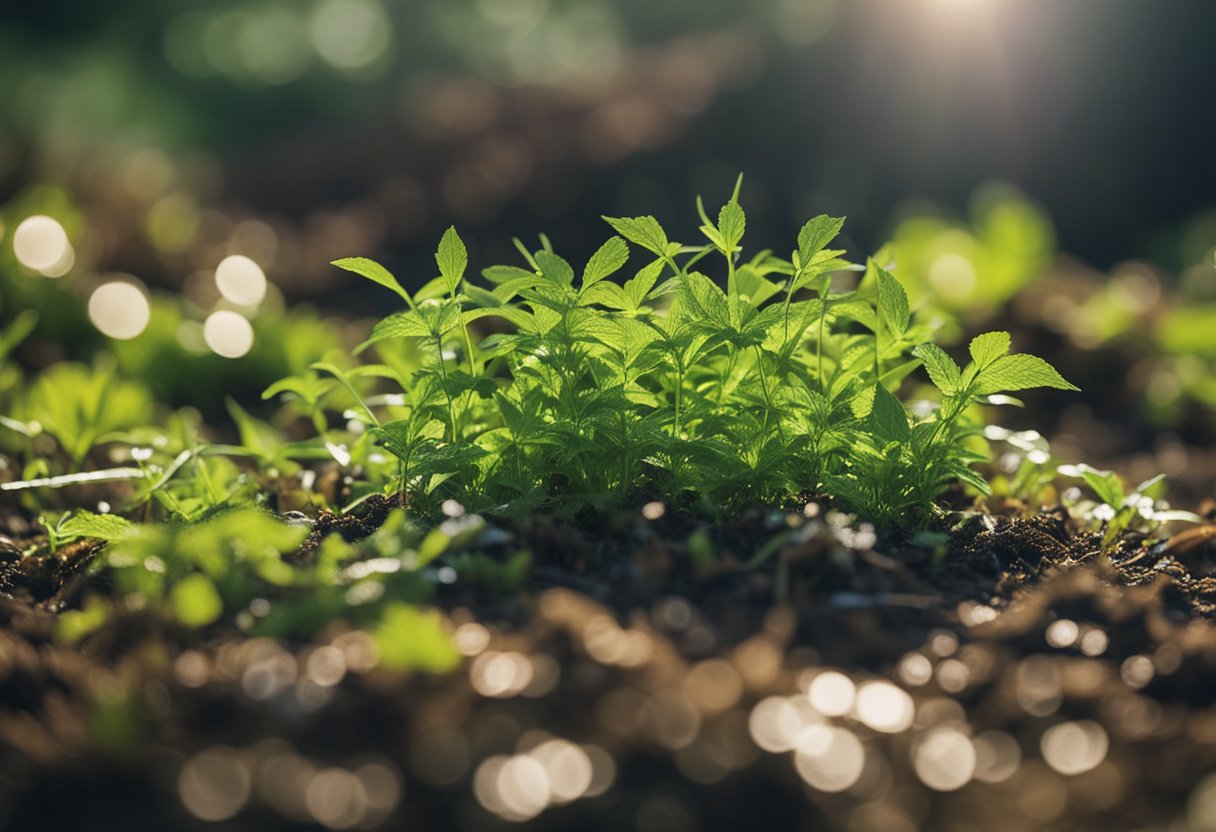As an Amazon Associate I earn from qualifying purchases.
At A Glance
Yes, you can compost pond weed. Pond weed is organic material and will decompose over time in a compost pile. It’s categorized as a “green” compost material, providing necessary nitrogen to help break down “brown” materials like leaves and twigs. However, before composting pond weed, it’s advisable to ensure it’s free from any diseases or invasive species that could potentially spread to other areas of your garden. It’s also a good practice to allow pond weed to dry out before adding it to the compost pile to help expedite the decomposition process.
Composting is a great way to turn organic waste into nutrient-rich soil for your garden. However, not all materials are suitable for composting. One common question is whether pond weed can be composted. The answer is yes, pond weed can be composted, but there are some things to consider before adding it to your compost pile.

Pond weed is a common problem for pond owners, and it can be tempting to simply toss it into the compost bin. However, pond weed can contain harmful bacteria and parasites that can survive the composting process and infect your plants. To avoid this, it’s important to let the pond weed dry out for a few days before adding it to the compost pile. This will kill off any harmful organisms and make the weed easier to handle. Additionally, it’s a good idea to mix the pond weed with other materials, such as leaves and grass clippings, to balance the carbon-to-nitrogen ratio and speed up the composting process.
Understanding Composting
Composting is the process of breaking down organic matter into a nutrient-rich soil amendment. Organic matter includes things like leaves, grass clippings, food scraps, and yes, even pond weed. The process of composting involves microorganisms breaking down the organic material into a form that can be used as a soil amendment.
There are a few key components to successful composting. First, you need organic material to decompose. This can come from a variety of sources, including kitchen scraps, yard waste, and even pond weed. Next, you need the right balance of moisture and air. Too much moisture can lead to a smelly, slimy mess, while too little moisture can slow down the decomposition process.
In addition to moisture, compost piles need the right balance of carbon and nitrogen. Carbon-rich materials include things like dried leaves and straw, while nitrogen-rich materials include things like kitchen scraps and fresh grass clippings. A good rule of thumb is to aim for a 30:1 ratio of carbon to nitrogen.
There are different methods of composting, including hot composting and cool composting. Hot composting involves maintaining a high temperature in the compost pile, which speeds up the decomposition process. Cool composting, on the other hand, involves letting the compost pile decompose at its own pace, which can take several months to a year.
Overall, composting is a great way to reduce waste and create a nutrient-rich soil amendment for your garden. With the right balance of organic material, moisture, and air, you can turn pond weed and other organic matter into a valuable resource for your garden.
Composting Garden Waste

I always compost my garden waste, including grass clippings, garden plants, and leaves. However, I am careful to avoid composting weeds that have gone to seed. Weeds can be composted, but it is important to ensure that they are not going to spread in the garden when the compost is applied.
To create a successful compost, I maintain optimal conditions throughout the process. During the spring and summer, I use a rake to collect grass clippings and other garden waste. I then add these materials to my compost pile, which I keep moist and turn regularly.
In addition to garden waste, I also compost fruit and vegetable scraps from my kitchen. By composting these materials, I am able to reduce the amount of trash that I produce.
Overall, composting garden waste is a great way to create rich, organic soil for your garden. However, it is important to be mindful of what you are composting to ensure that you are not spreading weeds or other unwanted plants in your garden.
Composting Pond Weed

Pond weed is a common aquatic plant that can be found in many garden ponds. When it comes to composting, pond weed can be a great addition to your compost pile. However, there are a few things to keep in mind.
Firstly, it’s important to remove any excess water from the pond weed before adding it to your compost pile. This can be done by leaving the weed out in the sun for a few days or by squeezing out any excess water by hand. This will prevent excess moisture in your compost pile, which can lead to anaerobic conditions and unpleasant odors.
Secondly, it’s important to ensure that any pond weed you add to your compost pile is free of any seeds or reproductive structures. This is because some pond weed species can reproduce asexually, and any reproductive structures left in the compost pile could lead to the weed growing back in your garden. If you’re unsure whether your pond weed contains any reproductive structures, it’s best to err on the side of caution and dispose of it in the trash.
Thirdly, it’s important to mix your pond weed with other organic matter in your compost pile. This will help to balance the carbon-to-nitrogen ratio, which is important for the proper decomposition of organic matter. Mixing your pond weed with other organic matter will also help to ensure that the compost pile doesn’t become too wet or too dry.
In addition to pond weed, there are many other types of weeds that can be composted. However, it’s important to ensure that any weeds you add to your compost pile are free of any seeds or reproductive structures. This will help to prevent the spread of weeds in your garden.
Composting is a great way to reduce waste and create nutrient-rich soil for your garden. By following these tips, you can successfully compost pond weed and other types of weeds, and create a healthy and productive garden.
Composting Weeds: Precautions and Tips
When it comes to composting, weeds can be a bit of a tricky subject. While it’s true that you can compost most weeds, there are some precautions and tips to keep in mind to ensure that your compost stays healthy and weed-free.
First and foremost, it’s important to remember that not all weeds are created equal. Annual weeds, for example, are generally easier to compost than pernicious weeds like dandelions, bindweed, Japanese knotweed, couch grass, creeping buttercup, buttercups, and oxalis. These weeds have deep roots and runners that can survive the composting process and end up sprouting in your garden once you spread the compost.
To avoid this issue, it’s recommended to remove any pernicious weeds from your compost pile and dispose of them separately. You can either burn them or send them to a green waste facility that can handle them properly.
Another precaution to keep in mind is to avoid composting weed seeds. While most compost piles get hot enough to kill weed seeds, it’s still a good idea to avoid adding any weed seeds to your pile to prevent any potential issues down the line. If you’re unsure whether a particular weed has gone to seed, it’s best to err on the side of caution and dispose of it separately.
If you’re composting annual weeds, it’s recommended to chop them up into small pieces before adding them to your pile. This will help speed up the composting process and ensure that the weeds break down properly. You can also mix them with other compostable materials like leaves, grass clippings, and kitchen scraps to create a balanced compost mix.
Finally, if you’re dealing with a particularly weedy area in your garden, you may want to consider solarizing the soil before planting. This involves covering the area with clear plastic for several weeks to kill off any weed seeds and roots. Once the area has been solarized, you can add compost to the soil to improve its fertility.
By following these precautions and tips, you can safely compost most weeds and create a healthy, nutrient-rich soil amendment for your garden.
Composting Equipment
When it comes to composting pond weed, having the right equipment can make all the difference. There are several types of composting equipment available, including compost bins, barrels, and tumblers.
Compost bins are a popular choice for backyard composting. They come in a variety of sizes and styles, from small plastic bins to large wooden structures. Compost bins are designed to hold organic materials like pond weed, along with other yard waste and food scraps. They are typically made of durable materials like plastic, metal, or wood and have a lid to keep out pests.
Compost barrels are another option for composting pond weed. These devices are designed to hold organic materials and allow them to decompose over time. They are typically made of plastic or metal and have a lid to keep out pests. Compost barrels are often smaller than compost bins, making them a good choice for those with limited space.
Tumblers are a type of composting equipment that allows you to turn your compost easily. They are designed to hold organic materials like pond weed and other yard waste, and are typically made of plastic or metal. Tumblers have a handle that allows you to turn the compost, which helps to aerate it and speed up the decomposition process.
No matter which type of composting equipment you choose, it’s important to select one that is appropriate for your needs. Consider the amount of pond weed and other organic materials you will be composting, as well as the amount of space you have available for composting. With the right equipment, composting pond weed can be a simple and rewarding process.
Using Compost in Your Garden
As a gardener, you know that the quality of your soil is crucial to the success of your plants. Compost is a great way to improve your soil’s health and fertility. Compost is a natural fertilizer that provides your plants with essential nutrients they need to grow strong and healthy.
One of the best things about compost is that it is a slow-release fertilizer. This means that the nutrients are released over time, giving your plants a steady supply of food. Compost also improves soil structure, which helps to retain moisture and prevent erosion.
In addition to using compost as a fertilizer, you can also use it as a mulch. Mulching with compost helps to retain moisture in the soil, which reduces the need for watering. It also helps to suppress weeds and regulate soil temperature.
When using compost in your garden, it’s important to remember that not all compost is created equal. Some compost may contain weed seeds or pathogens that can harm your plants. To avoid this, make sure to use compost that has been properly cured and heated to kill any weed seeds or pathogens.
You can use compost in a variety of ways in your garden. Here are a few ideas to get you started:
- Mix compost into your soil before planting to improve soil health and fertility.
- Top-dress your garden beds with compost to provide your plants with a slow-release fertilizer.
- Use compost as a potting soil for your container plants.
- Mulch your garden beds with compost to retain moisture and suppress weeds.
Compost is a valuable resource for any gardener. By using compost in your garden, you can improve your soil’s health and fertility, reduce the need for watering, and suppress weeds.
Environmental Impact of Composting
Composting is a great way to reduce waste and create nutrient-rich soil for gardening. However, it is important to consider the environmental impact of composting, especially when it comes to composting pond weed.
Firstly, it is important to ensure that the pond weed is compostable. According to experts, pond weed can be composted effectively, but it is important to ensure that the composting process is done correctly to avoid any negative environmental impact.
One potential environmental impact of composting pond weed is the release of harmful chemicals and greenhouse gases. When organic matter decomposes, it releases carbon dioxide and other gases into the atmosphere. However, this impact can be minimized by ensuring that the composting process is done in a controlled environment, such as a compost bin or pile.
Another potential environmental impact of composting pond weed is the use of cardboard or other materials to aid in the composting process. While cardboard is compostable, it is important to ensure that it is not coated in any harmful chemicals or substances that could harm the environment.
Overall, composting pond weed can be a great way to reduce waste and create nutrient-rich soil for gardening. However, it is important to ensure that the composting process is done correctly to avoid any negative environmental impact.
Managing Pests in Compost
When composting, it is important to manage pests to ensure that the final product is healthy and safe for use in the garden. Pests can include insects, rodents, and other animals that are attracted to the food scraps and organic matter in the compost pile.
One way to manage pests in compost is to maintain a proper balance of green and brown materials. Green materials, such as food scraps and grass clippings, provide nitrogen for the compost pile, while brown materials, such as dried leaves and twigs, provide carbon. By maintaining a balance between these materials, the compost pile will heat up properly and discourage pests from taking up residence.
Another way to manage pests in compost is to turn the pile regularly. Turning the pile helps to aerate it, which promotes the growth of beneficial bacteria that break down the organic matter. It also disrupts the habitat of pests, making it less attractive for them to live in.
If pests are still a problem, there are a few things you can do. One option is to cover the compost pile with a tarp or other material to discourage pests from entering. Another option is to use a natural pest repellent, such as diatomaceous earth or neem oil, to deter pests from taking up residence in the compost pile.
It is important to avoid using chemical pesticides in the compost pile, as these can be harmful to beneficial bacteria and other organisms that are essential for the composting process. By following these tips, you can manage pests in your compost pile and produce a healthy, nutrient-rich product for your garden.
